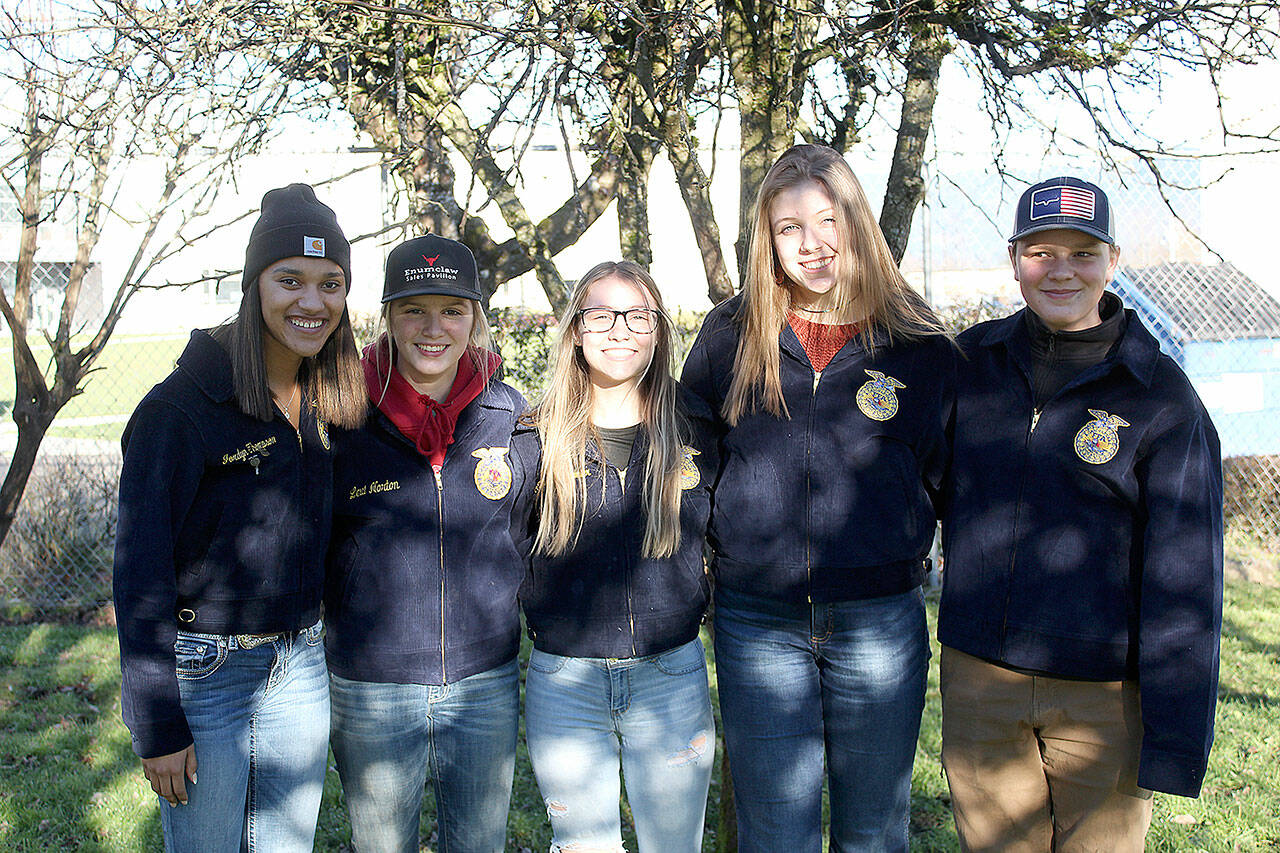Enumclaw High School FFA students are buzzing about a new project — beekeeping.
The leaders of the local chapter — Liah Arnold, Maddie Blechschmidt, Allison Dofelmier, Alyssa Seldal, Cody Seldal, and Jordyn Thompson — pitched starting their own hives to the queen bees of the district (the school board of directors and district administration) last November, and the powers-that-be approved the venture during the Jan. 18 board meeting.
“We’re basically doing this mainly as a learning experience for kids,” Dofelmier said in a recent group interview. “Bees have a lot to do with agriculture, and there’s a lot of issues… with bees right now, so it would be a learning experience for kids, to show them what the problems… are going on with them, and how we can help, locally.”
One of the issues, Thompson said, was that bee populations across the country have been in decline; according to the United State Department of Agriculture, managed bee colony numbers have decreased from 5 million in the 1940s to just about 3 million today.
Tracking bee populations is tricky work, and it’s not always clear whether the overall population of an area is decreasing, or if the colony loss is just part of an annual cycle.
For example, according to the nonprofit Bee Informed Partnership (BIP), beekeepers in the U.S. lost more than 45 percent of their managed bee colonies between April 2020 and April 2021, the second highest annual loss on record since the group started tracking colony losses more than a decade ago.
According to BIP’s Science Coordinator Nathalie Steinhauer, normal or acceptable annual turnover is around 20 percent.
“We should remember, however, that loss rates are not the same as population decline,” she told Auburn University’s newsroom last year. “The recent numbers of honey bee colonies in the U.S. are relatively stable despite those high losses, but that’s because beekeepers invest a lot of time and effort to increase their operation size to mitigate their losses.”
Washington beekeepers lost more than 52 percent of its colonies in 2016/2017, BIP’s interactive colony loss chart shows. The following year, it was just over 48 percent; in 2018/2019, 66.5 percent; 2019/2020, nearly 58 percent; and last year, close to 57 percent.
Given that overall colony loss seems to be on the rise, the ultimate goal of the high school project (beyond education) is to produce enough bees through its colonies to give out to the local community.
“With a package of bees, you can take them home… and they help with pollinating your fruits, your vegetables, all the plants around,” Blechschmidt said. “They can create a hive at your house, so it would help spread bees around.”
But that’s far down the road, FFA teacher Mark Berryhill said, as the group hopes to start up with just four or five hives this spring. If the project is successful, he added, up to 10 hives could be kept behind the school.
(Intere-sting fact: colonies can range between 20,000 to 80,000 female worker bees, as well a handful of male drones and, of course, the queen — meaning EHS could become home to hundreds of thousands of bees at full buildout.)
The cost to start up beekeeping is minimal, the students told the school board; up to $300 per hive, about $150 for three pounds of bees (there’s about 3,500 bees per pound), $75 for a bee-suit (and they’d need several), and finally, $1,000 for additional fencing.
Luckily, all this might be covered, Dofelmier said, because the FFA group applied for a $4,800 grant (they have not officially been awarded the grant as of print deadline, and the students declined to name the donor).
The group is also going to cut costs by utilizing the talent of other students by outsourcing wood shop, welding, and other “career” classes instead of purchasing pre-made items.
Additionally, the bees could be a source of income for the FFA.
“It would be two or three years before we get honey,” Dofelmier said, because the hives need to first make enough honey to survive the winter months before any excess honey can be harvested. But once honey can be collected, “our goal is to be able to have our classes, like animal science or floral, anyone who wants to in the Ag department, to make beeswax chapstick or small things that we can use as fun little projects.”
“Right now, we do a… dinner and auction to support us going to state, so I feel like if the kids really needed that extra money to go, I feel like we can use the bee products,” Arnold added.
It’s also possible for the FFA group to rent out its hives to local farmers to help their crops get pollinated; broccoli, cabbage, pumpkins, and squash are just some of the local plants that highly rely on bee pollination.
Although costs appear to be covered, the students made it clear any community support — especially donated bee-related equipment — would be highly appreciated.
“We would love it,” Arnold said.


